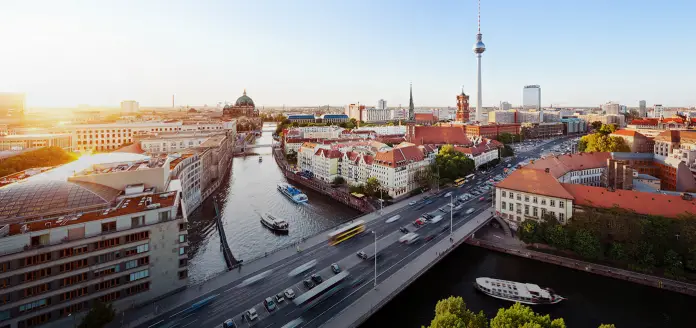Out of all Europe, it’s Germany that IT emigrants usually seek. And as a rule, to Berlin – there is always the greatest number of vacancies, some of the highest salaries, and not as expensive life as in Munich or Frankfurt on Main. But how did Berlin manage to become so attractive to foreign developers? And what makes it special among other cities in Europe and Germany?
What’s the difference between Berlin and other Germany?
The main feature of Berlin is that over the last 10-15 years, investors started to flock here, and foreigners started to come here to start their startups. All this has snowballed, and it has completely changed the IT culture of Berlin and the city itself.
In the rest of Germany, the technology sector is still run by corporations, huge and clumsy: Siemens, Bosch, Volkswagen, Audi, Deutsche Bahn, Lidl, Deutsche Post. They have interesting IT, but the technology and processes are somewhat outdated. Everything happens very slowly: a new feature may take months to coordinate, but it may take years to implement. Or spend hours in meetings on documentation to documentation.
Ordinary commoners can especially see it in the banking sector – it evolved in the ’70s and ’80s and stopped at this point. Many key things are written in a rather complicated and old Cobol programming language: this code works, but no one dared to rewrite it all globally for a long time (because even a minor error can have quite serious consequences for many generations of customers). Now some banks are trying to switch to the new rails, but it’s a very slow process. Some banks still don’t even have personal accounts or mobile applications.
In Berlin, the situation is very different, because most of the companies are startups or have only recently grown out of them. In the last three years alone, dozens of promising startups like CoachHub and Sharpist have emerged here. Some of the companies are on our radar as well, like Soundcloud. There are even entire lists of Berlin startups – one, updated in 2021, has as many as 115 of them, and that’s with the pandemic.
Because of the abundance of startups, the pace of development in Berlin is different – everyone is trying to work faster, outpace the competition, and is constantly testing and rolling out something new.
Life has also been affected by this flood of startups. Berlin used to be different from other German cities. This is a common feature of almost all capitals: Moscow is not like the rest of Russia, Prague is like the Czech Republic, and Mexico City is like Mexico City. But the abundance of startups has made Berlin even more “different.
First of all, the change was due to the huge influx of foreigners working in the IT field. There were a lot of foreigners before that: Russian-speaking repatriates, natives of Vietnam and others. But the startups attracted a lot of “newcomers” – according to my feeling, there are about 10% of them here. This made the city very multicultural, not so “German. Maybe it has even depersonalized in some ways, but because of that a foreigner feels much more comfortable here than in other German cities. It’s hard to feel like a stranger here – there are so many “strangers,” they’ve already become “their own.
The easiest way to see it’s in the language. English is almost more common than German in Berlin’s central districts. And you can easily get by without German – with English you’ll have no problem buying groceries, getting a job, or asking for directions.
Why Berlin is European startups capital?
Most European countries are not as conservative as Germany, where IT is more modern and not at the mercy of corporations. But Berlin wins here too, only not at the expense of technology and processes, but at the expense of volume. There are more startups here than in any other European city, and investors’ money flows in like a river.
Other countries are also trying to create IT hubs. Barcelona in Spain, Lisbon in Portugal, small towns in Italy – they are all trying to grow startups, attract investment, and lure foreign engineers to them. But so far, Berlin remains the leader.
I see several reasons why Berlin is in such a good position compared to other European cities:
High wages. Germany is a rich country with a lot of money. German firms can afford to pay developers 4-5 thousand euros a month before taxes, and this is far from the limit. So developers inevitably reach here for the money. Even though it isn’t cheap to live in Berlin, the salaries in the IT-sphere still cover these enormous costs. And with them, it’s very pleasant to go on holiday to other cities and countries in Europe, where prices are lower.
Support from the state. In Germany, it’s quite difficult to remain without a livelihood. Even if the startup goes bankrupt, you will not be left completely penniless – and that opens up room for experimentation.
The power of inertia. New startups are drawn to places where there is already IT infrastructure. Why open somewhere in a small Italian town when you have employees, investors, and everything you need for business in Berlin.
But I wonder how it all started back then? What, more than 10 years ago, was the basis for such a “snowball” of startups? I think the point is that in Berlin they launched “create your own startup” programs right on the basis of universities. Yesterday’s students could present any ideas, get funding for two years, and experiment. They sat down, programmed, and got 2,000 euros a month, which was an excellent salary for a graduate. If the idea didn’t work out, nothing had to be paid back. That’s when startups “took off,” and then they started attracting investors and other startups. Now it won’t be easy to repeat that success.
Berlin has a good reputation. Even before the 90s, Berlin was considered an enclave of freedom and creativity. Those who wanted to create, experiment, and create new things came here from all over the world. The atmosphere has always been conducive to bold ideas.
In addition, 10 years ago, Berlin already had an excellent infrastructure, and at the same time by the standards of the rest of Europe, it was quite cheap. We, for example, rented a two-bedroom apartment for 500 euros a month at the time. Now, of course, Berlin has become more expensive, but then, 10 years ago, the low prices attracted thousands of young specialists here.
Why IT specialists should head to Berlin
High wages and worldly comfort are features common to almost all of Europe. But thanks to the startup culture, Berlin has three other pluses for IT immigrants:
Lots of different and interesting projects. The abundance of start-ups means that there is always a job for any IT-engineer. And often quite interesting, where you can see the results of your labors right away.
And if the project ends (or you decide to quit), you can very quickly find something new – there are tons of open positions. It is easy to wander between different jobs, and the risk of losing money is minimal. And you certainly don’t have to leave here for somewhere else – you can come and settle down forever.
By the way, if you want to be in startups, it is better to look for vacancies on English-language sites: Linkedin, StackOverflow, BerlinStartupJobs. There are also many vacancies on German sites like Monster.de, Stepstone or Xing, but they often look for people in conservative large corporations. And there you won’t get the same IT drive as in start-ups. And you might need knowledge of German.
Transparent immigration processes. Thousands of foreigners come here every year. All relocation has long been tested, every obscure point in the law explained a thousand times, for foreigners, there are a bunch of agencies and services to help with the move. And if something is not clear – there are dozens of forums for migrants, who are happy to tell you everything. For example, “Life in Germany”.
It is easy to integrate into society. First of all, you don’t need to know German, English will be enough. Secondly, there are so many foreigners that they are treated normally – no one skewers or condemns. Thirdly, there are a lot of expat communities. You can easily make friends here, and you won’t feel completely alone in a foreign country. This greatly increases the quality of life, especially right after you move.






